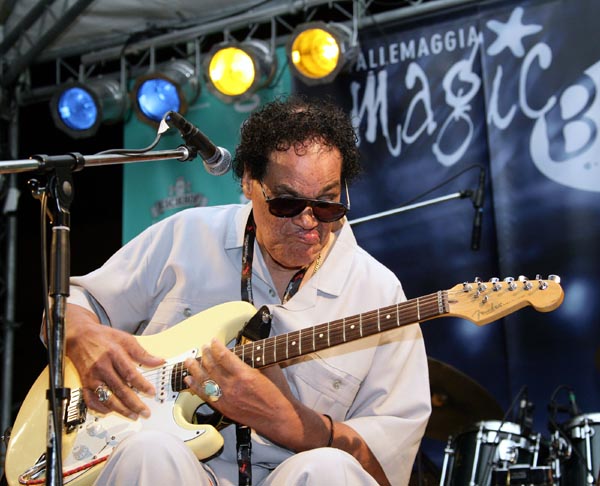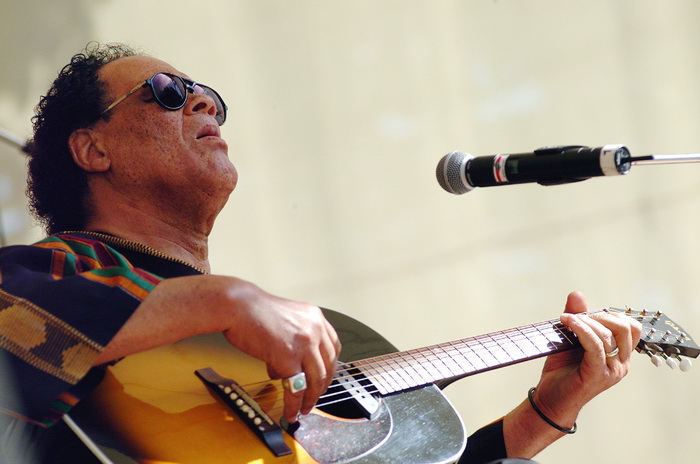25 Feb Louisiana Red: Memories of a Bluesman by Alex M. Franquet
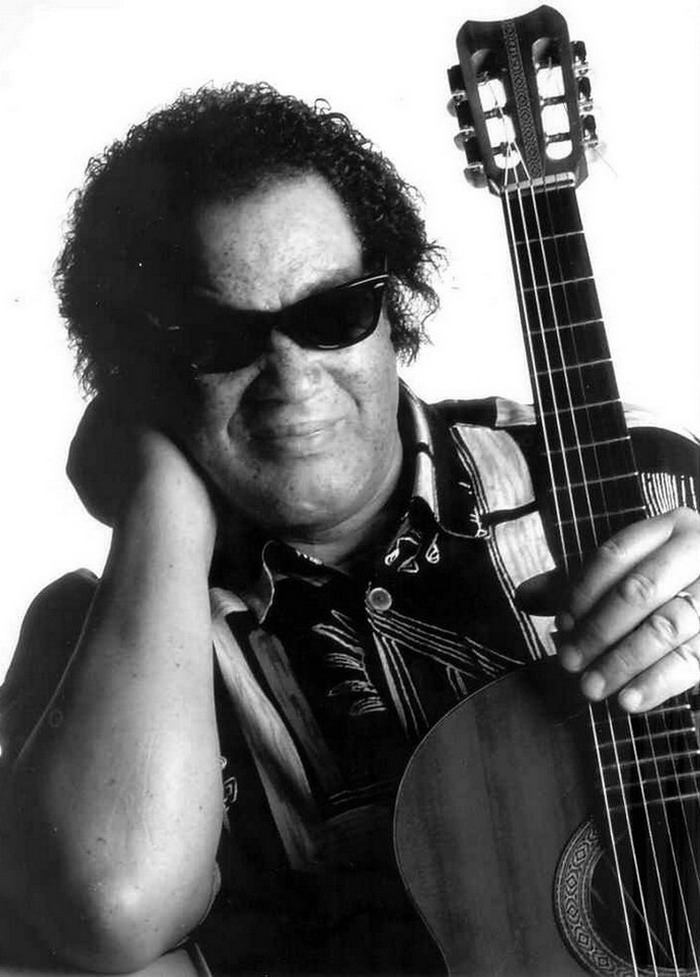
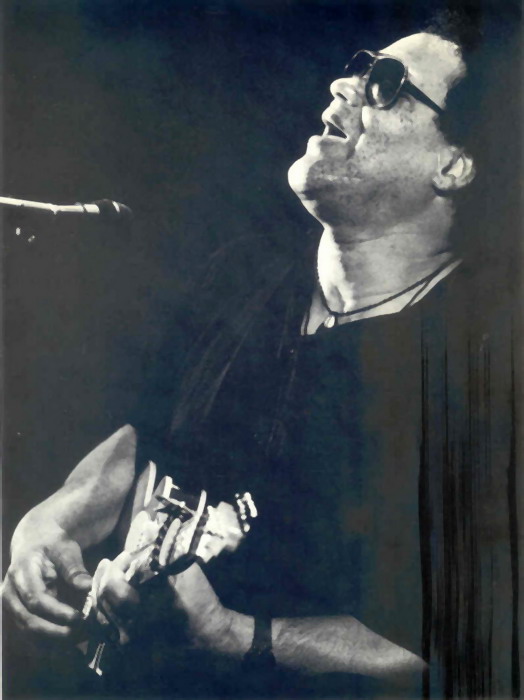
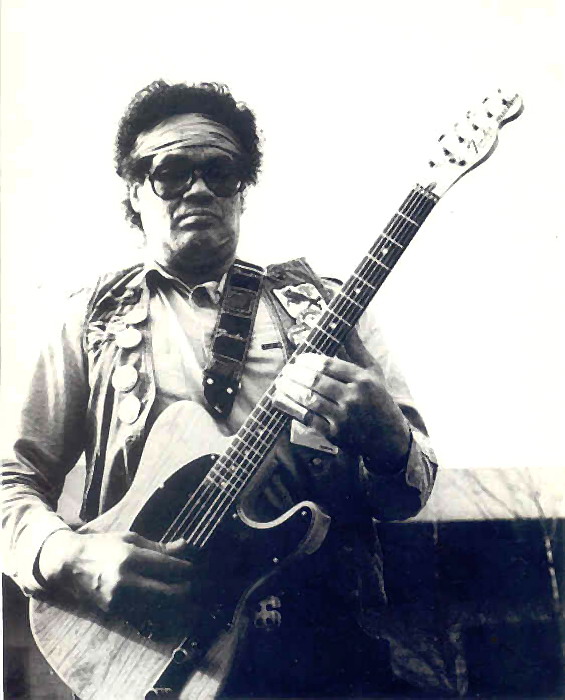
In his last visit to Barcelona, I had the pleasure to talk with Louisiana Red and going over some episodes of his so intense life, so intense. Now he looks back, he feels relaxed. He has paid all his debts. He is enjoying an active professional time. He appears to be young, energetic and eager to follow on preaching his blues. He have talked about everything. Muddy Waters, his life in Europe, his Muslim period and his friendship with soul singers. As a Korea veteran, we have event talked about the different wars his country has been involved in recent years. His advice and wish is clear: “Bring the boys back home”.
Alex Maria Franquet.: You have always been very comfortable at Europe. Why you did you choose Hannover to live?
Louisiana Red: Well, because Champion Jack Dupree got me my first apartment there and I have been there ever since.
A.M.F.: So your relationship with him was very close.
L.R.: Yes, very close.
A.M.F.: Why?
L.R.: Champion Jack Dupree was just like a father to me from our time in New York and over here. But I hadn’t seen him for many years and I met him again in Bern, Switzerland, at the Bern Jazz Festival. He and Mickey Baker. And he said why you don’t you come to Hannover and I’ll make you some gumbo soup. I had just come on a tour with Mr Rolf Schubert. That was in 1980, and that’s when I met Eric Burdon. Champion Jack Dupree said: come to Hanover and I’ll fix you some gumbo, which is Louisiana food, cajun food. I asked my road manager how close we were to Hannover and he said ‘550 miles from here’. I said ‘What?’ But finally I went to see him and there I have been all these years.
A.M.F.: I see you have a guitar that is the same model used by Elmore James?
L.R.: It is just like an Elmore James guitar. Jimmy Vivino gave it to me as a gift. The real Elmore James guitar… his own Homesick James has it. I don’t know if he will give it up one day. I am collector. I’d like to have it. Those men were icons in my life. Muddy Waters, Carl Hooper, Robert Nighthawk and I talked to his son last summer. He did a movie over here of my life. They showed it in Germany last month and they wanted me to come up and do a concert, but I could not do it because I had other concerts. But they’re going to show it again in Berlin and the name of the movie is ‘The Blues of Louisiana Red”. That’s the name of it, and they’re trying to get it on DVD.
A.M.F.: Did you ever see Elmore James live?
L.R.: One time. It was a glorious night too. The best night I had was with Muddy Waters and Little Walter and the whole band. That was one big night at the Zanzibar in 1952. That was when Leonard Chess and I were working on the record. But I wasn’t Louisiana Red, my name was Rocky Fuller. It’s me and Muddy, Little Walter and Jimmy Rogers together.
A.M.F.: Was it recorded live?
L.R.: No, it was in the studio, Chess’ studios.
A.M.F.: That night?
L.R.: No the next day of that gig I told you. I was so overjoyed I didn’t know what to do and I was asking Little Walter what kind of bottlenecks do you use… imagine that on the dressing room night table. Jesse was the one that sent for me. I was living in Pittsburgh, Pennsylvania and he sent me the money for me to catch a train and I came to Chicago and he was there to meet me at Central Station, downtown, Michigan Avenue, and took me to the office. I’ll never forget that number, 5249 S. Cottage Grove Avenue. It’s no more now. New buildings there now.
A.M.F.: How was the whole process of the recording of your first single?
L.R.: I made contacts with Scott Cameron, then Muddy Waters’ agent. When I arrived at Chicago, I asked Mr Leonard Chess, “Where am I going to stay tonight? I don’t know Chicago”. I said. I didn’t know that I was going to stay in a house and Muddy Waters came down and said “Hi Rodney, I am Mr Muddy Waters” and I said “Oh, I am so glad to meet you”. He took me to his house, and he fed me, well his wife Geneva did.
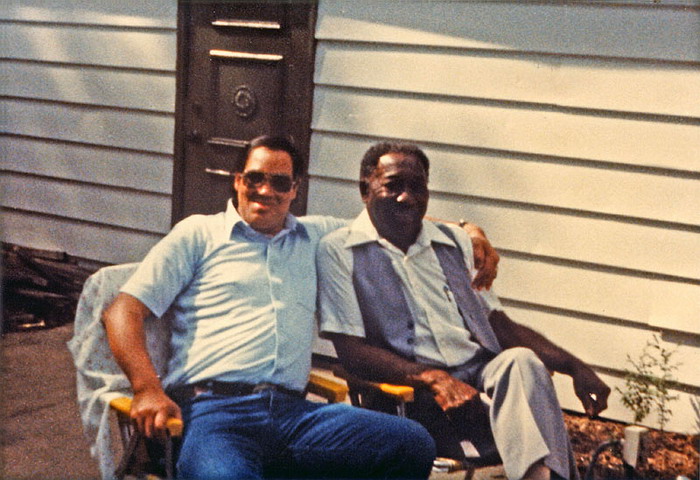
Louisiana Red y Muddy Waters
A.M.F.: You stayed at Muddy Waters’ house and his wife cooked for you?
L.R.: Right. Later, that night we went to the Zanzibar, at 13th and Ashland, and picked up Little Walter and Jimmy Rogers. He was driving a yellow and black top car, 1952 registered, brand new. He had a hat turned up like a cowboy hat and he was wearing glasses. I remember everything. I will never forget that day, never. We went to the Zanzibar and the place was jam packed. Everybody came that night. Sonny Boy Williamson, Elmore James, Lonnie Johnson, Sammy Lawhorn. It was great night. Then he called me up onto the stage to do a duo number with him and that’s when it kinda started. That’s when I started learning blues.
A.M.F.: What do you remember of Little Walter that night?
L.R.: Little Walter was fine, he played his harmonica through a suitcase amplifier, Sears Roebuck’s Silver Tone amplifiers guitar country and the amp was built in with the guitar and you could take the guitar. I had one of them. And he played his harmonica through that and played this hit record, “Juke”, that’s what they opened up the show with. And Jimmy Rogers was up there playing and backing Muddy with second guitar. I just cannot forget that night at all. I mean, when I left we went to the studio and that’s when they recorded me. We recorded “Money”, that is what it was called first, but finally it was called “Steel the Food”. I was there and it was Little Walter playing on second guitar and I was just sitting there looking and watching them. I said let me play and they said “Well then, we will be recording you”. So I played my guitar and I had a Silver Tone, brand new with a big body and they’re hard to find. They recorded me on Checker Records. He didn’t put me on Chess, he put me on the little label, Checker.
A.M.F.: Did you record lots of songs or only a few there?
L.R.: I did several other cuts and I do not know if they have brought them out yet. I just carried on playing and I sang. We spent the whole day in the studio. It was the studios owned by Chess, so we got a free day there.
A.M.F.: So, maybe one of these days we will find a whole CD of yours with that unreleased material.
L.R.: Yes, we probably will.
A.M.F.: Will we find lots of unreleased stuff at Roulettte like Chess?
L.R.: Yeah, there’s a lot of unreleased stuff of mine. Also when I was on Atco Records, a division of Atlantic Records and they kept a lot back in the studio. That’s when I made Louisiana “Red Sings the Blues”.
A.M.F.: I think you also had a good relation with John Lee Hooker and his family.
L.R.: I knew since my days in Detroit, working for the car industry. Before I left Germany I had the pleasure of meeting John Lee Hooker Junior. I knew him since he was a little boy back then and he knew me and had seen me for many years, from back in 1953, or something like that. I was introduced as Louisiana Red. He said “I know, this is my uncle Red”. I said, “Yeah, it’s my nephew”. He honoured me on the stage and he said “Ladies and gentlemen, here is another member of the Hooker family”.
A.M.F.: Why did you have this relationship with him?
L.R.: Because I stayed with Uncle John lots of times. I stayed with Eddie “Guitar” Burns. I was around all those Blues friends. I knew them all at Detroit, like Baby Boy Warren, Bobo Jenkins. I hung around them people. I met Tampa Red before he died, I went to see him and stayed all day in the central nursing home and I said “I love to be around you people. I love to sing and I love the blues”. I wanted to be around blues players.
A.M.F.: The collaboration with Chess, why didn’t you carry on?
L.R.: I didn’t go on because I had to go back to work and at that time I was working in the steel mill and I could not lose my job. I had to go back to Pittsburgh and back to work. My vacation was over. I was 16 years old and working in a steel mill. I was a big boy then. My son is bigger than me, he’s into the piano.
A.M.F.: He could be a basketball player?
L.R.: Yes, but he’s a truck driver, tractor-trailer thing, that’s what he does. He’s operating those things. Then his uncle taught him piano, my ex-brother in law.
A.M.F.: What made you stop playing the guitar during some time?
L.R.: Well I gave it up for about ten years because I was disgusted. I wasn’t given any royalties by the record company and I wasn’t given any prestige and I just gave it up. So one day, a friend of mine, the late Bill Dicey, said “Someone wants to meet you, I’m coming down to get you”. He left his job and his office and came over to New Jersey where I was living and took me to New York and that’s where I met Tony Robertson and Ernie Leadbetter and I met Jim Robertson, that’s her husband, and they owned a record company. They were stockholders, and Kent Cooper, who was the owner. Kent showed me my record that I did back in the 1960’s, yeah, 1968. He said “We’ve been looking for you for years”. I didn’t know that they wanted to find me. That’s when I began to get recognised and we made “Sweet Blood Call”. Eric Burdon took it and made millions out of it. He turned it into rock.
A.M.F.: When you were younger, what made you want to play the guitar?
L.R.: When I was younger, I used to go round these old street players and used to watch them and I thought “I wish I could do that”. One day, I was on a street in Pittsburgh and I saw a guy playing guitar and I asked him if would teach me to play guitar and he said he would teach me what he knew and just cut me in. I went to that man’s house every day, I mean every evening I was there. His name was Crit Walters, they called him Boy B. I started taking lessons from him. From then I started…no practicing, because you don’t practice blues…I started rehearsing blues, learning different songs and before you knew it I was playing. I used to get on the roof at my uncle’s house with my guitar and play the blues up there. I was about 14. I was a hard worker. Nobody gave me anything, it all came out of my own money. When my aunt put me out and I went on my own and got a place and worked hard down in Mississippi. I met Peg Leg Sam in New York and I drove down to South Carolina to see him. We had a good time and I made a record with him too, “Blowing Train Blues” where he played the harmonica on. He’s gone now. I knew Hammie Nixon, Sleepy John Estes, Eddie Kirkland, Johnny Shines, one of the main influences on Robert Johnson, those two used to run around together. Johnny Shines taught me all about Robert Johnson.
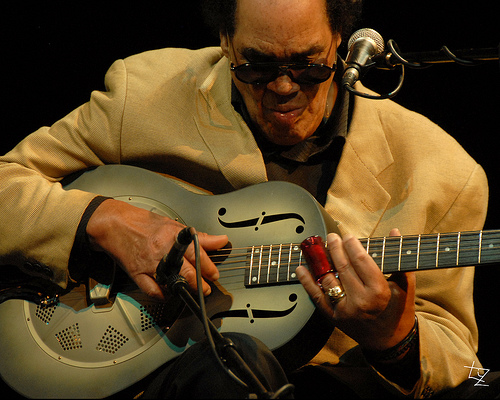
A.M.F.: I want to ask you about a song I’ve always liked. It was important for English collectors, it was called “I done wake up”.
L.R.: Oh yeah, that was when I was at Atlas Angletone Records. It was a 45.
A.M.F.: What do you remember about that record?
L.R.: That’s when I first played with James Wayne in New Jersey at Billy’s Night Club,. I asked if I could sit in with him and started playing. Then he invited me to record some songs.
A.M.F.: This song was printed as a single in England in the 1960’s by Sue Records. Have you ever seen it?
L.R.: I haven’t seen that. I gave my aunt a copy of that record and she passed away. When I go to see my cousin in New Jersey I am going to tell him to go up there and get me that record. It’s still brand new and is still in the jacket. I know that collectors would love that. It’s an original pressing, with original jacket. It has never been played.
A.M.F.: What made you write this song?
L.R.: The owner of Atlas/Angletone Records, Tommy Robinson, took me to New York. That’s when I first played with James Wayne in New Jersey at Billy’s Night Club,. I asked if I could sit in with him and started playing. Then he invited me to record some songs. I really didn’t have any song when I showed up so I composed some of them right in their office, about marrying a black woman with a white woman’s ways. I went into Studio B. I will never forget it and he recorded that with James Wayne and the Nighthawks playing behind me. Lee Johnson, Willy James McFadden, Clyde McFadden’s brother, he was on piano. We started to work together there and we had a good time. James then made a record called ‘This Little Letter’ and I’ve been singing that frequently, I like it. I had an old Silver Tone guitar and I wish I could get some pictures from those days. I had a dark suit on, real short haircut and I had my Silver Tone guitar. I had a good time back in the 50’s.
A.M.F. By then, you had just returned from Korea.
L.R.: I had been into the army. I served for four years. I was disgusted by going into the army. Then I went back to music. Did this record at Atlas and something at Roulette.
A.M.F.: You had a close relation with the city of Detroit.
L.R.: Yes, I worked there because the motor industry needed a lot of men. I worked as a hot press trimmer operator, this machine that was trimming the cylinders. Working for General Motors… I thought I’ll write a song about this. About the vehicles coming off the assembly line… When it was dark and seeing all those cars coming along. That’s when I wrote a song about the Motor City. That’s my town. Detroit is my second home. When I go there, I got to see Eddie Burns every time.
A.M.F.: I am a fan of Motown, the soul music sound.
L.R.: I must tell you I met Marvin Gaye several times. We were on a show one night “The Porky Edwards Show”, in New Jersey. That’s where I met Slim Harpo, he had just had a big record ‘Scratch My Back’. He was on the show. Marvin tried hard to get me to come to Detroit and to get signed by Motown because he liked what I was doing. I know he did some contacts and talked about that and if I’d gone there, now I probably would be in Hollywood. But I didn’t go that way, I loved the blues. I didn’t like this soul music. I like my blues.
A.M.F.: Your hard blues style maybe couldn’t have fitted at Motown, but lots of artists, like Bobby Bland, tried to mix blues with soul.
L.R.: Yeah, but that’s not my way. I know Bobby. I know him well. He is not singing any more because he had trouble with his voice.
A.M.F.: You had a special relationship with Marvin Gaye?
L.R.: Yeah, we were good friends. I hadn’t seen him for quite a while and then his father killed him. That really knocked me out. It’s just like Sam Cooke. It’s strange what happened to these people think. I met him in Buffalo, New York, in 1961. He didn’t want to pay for the room or something like that and he was having some trouble.
A.M.F.: So you said no to Motown?
L.R.: Yes, I was with Roulette then and I said no.
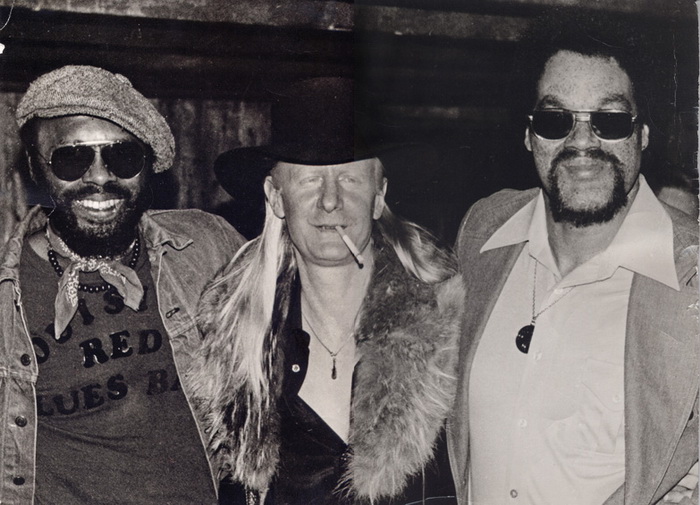
Louisiana Red y Johnny Winter
A.M.F.: So, you are one of the few people to say no to Berry Gordy.
L.R.: Well, I stuck with Roulette then Henry Glover started his label.
A.M.F.: You had a relationship with the Black Muslims?
L.R.: I wanted a different religion and I joined. I met this Muslim woman. That’s a long story. A lot of things I don’t wanna think about. I eventually left Pittsburgh. I stayed at Bert Thomas’. Then I came overseas and did the Montreux Jazz Festival and that’s where I met Rob Steadman and he said if I ever do it again then I would be one of the first artists he’d sign. I thought he was playing. I thought it was another mad promise. Bless my soul, one day I was in New York. The phone rang and the voice said “This is Horse” and I said “I don’t know no Horse”’. He said “I met you at the Montreux Festival. I want to record you and give you a thousand dollars”. My brother in law said “Son, if you want my car you can go”. I said no, we gonna get our own place.
A.M.F.: Those were the hardest years of the civil rights fight?
L.R.: Yeah. It was a hard fight. That’s what that song’s about “Ride On Red”. It wasn’t a hit record but the people liked it. You see, when I make the blues I make it about what’s happening today. There are so many wars now. Whether you pick up a paper or turn on the television, there’s either news about a war or a hurricane or something. I like poetry, so I take my poetry and turn it into song.
A.M.F.: Did you ever met Malcolm X?
L.R.: I never had the chance to meet Mr X. I was in a different movement. I was in the MoorSignsTemple of America. It’s connected to the Muslims, but we are descendants of Morocco and born in America. I was Iversen B as my Muslim name. Those days there were good days. I enjoyed the meetings. I still got the blues from then. I studied the Holy Koran. I remember verses. Now I am interested in the Catholic religion. My wife is from Ghana and every time we go there we go to church every Sunday. A joint church for Catholics, Protestants and Hebrews. Every religion. That’s what I belong to. I want to make a donation to the orphanage in Ghana. When I get my royalty money I am going to do that. That’s why I’m selling my records, for the children with Unicef. Because I’m an orphan myself, that’s why I’m doing it. That’ll all be in my book. That’ll go with the movie. The name of the book is ‘Nobody’s Child’. It should be printed this year.
A.M.F.: Well, thank you Mr. Red for all your kindness.
L.R: You’re welcomed. A real pleasure to share this time with you.
